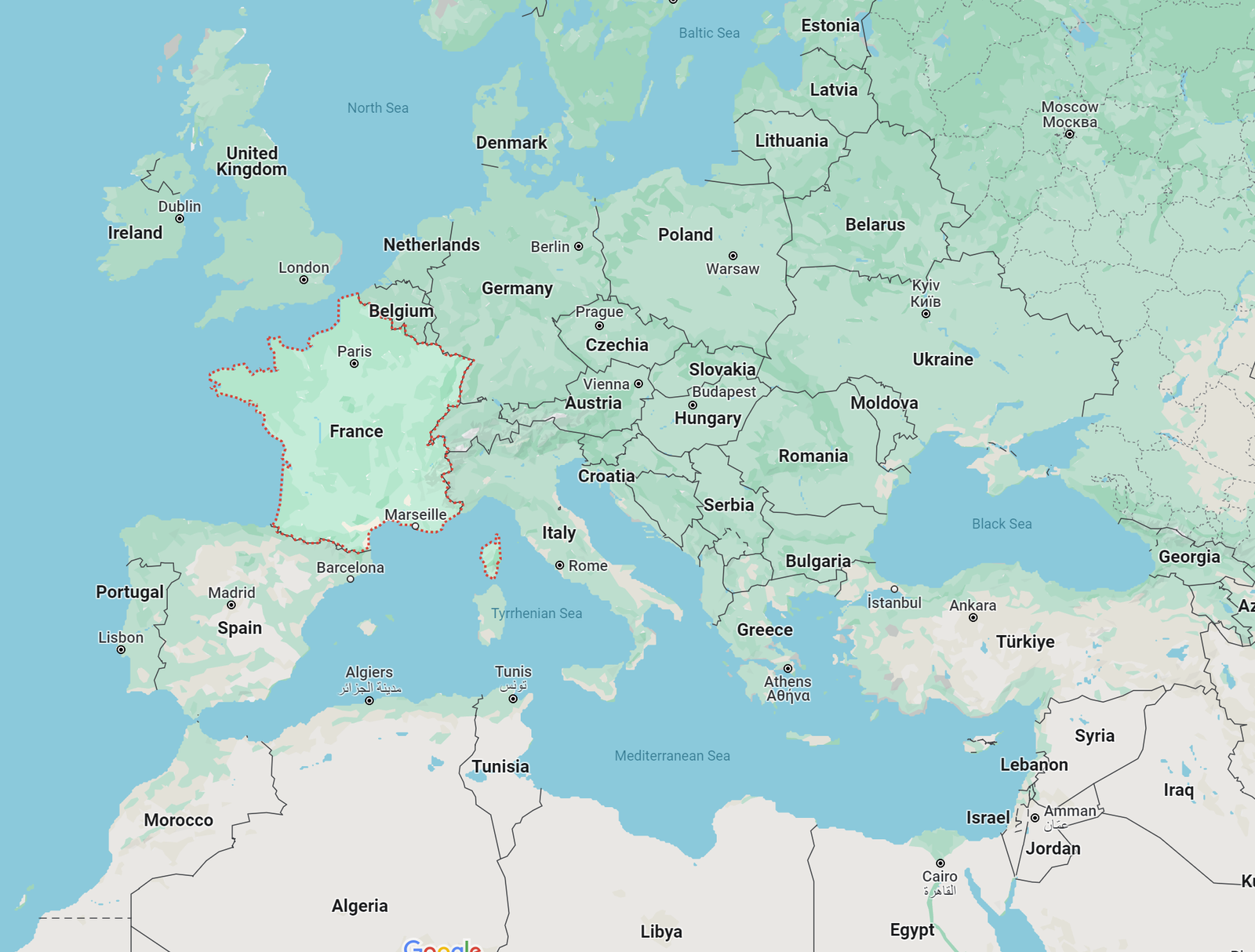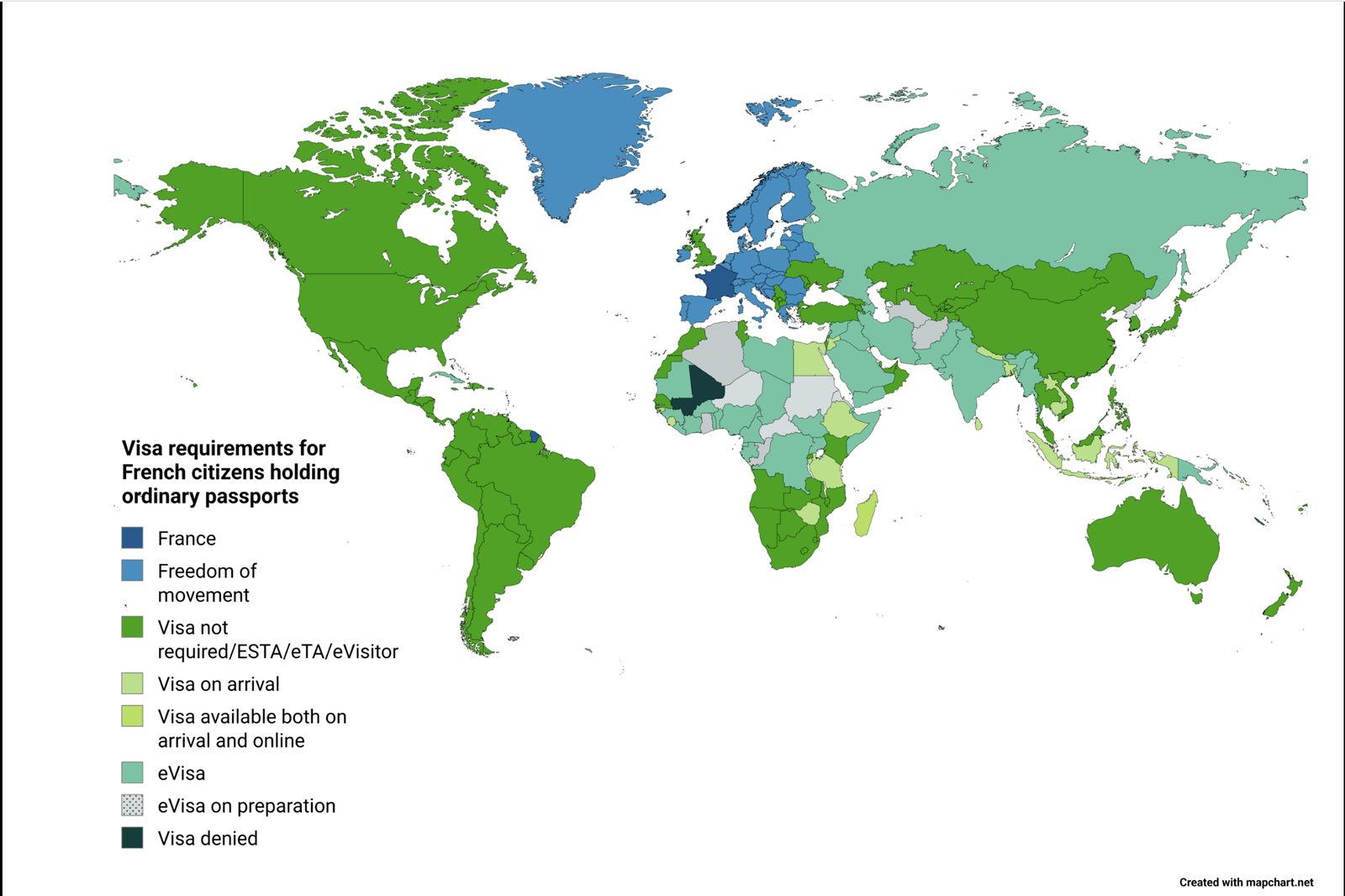How To Get Residency in France: A Comprehensive Guide
Capital: Paris
Population: 68,605,616 (2025, 20th)
Ethnic groups: 76.9% French
Area: 643,801 km2 (42nd)
Offical Language: French
Currency: Euro
GDP per Captial (PPP): $54,464.98 (2024, 26th)
Human Development Index: 0.920 (2023, 26th)

Country Profile:
France, a Western European nation, is a prominent member of both the European Union and the Schengen Area. It boasts a rich history and a profound cultural influence that resonates globally. Iconic symbols such as its art, architecture, exquisite cuisine, renowned wines, the majestic Eiffel Tower, and the world-famous Louvre Museum all contribute to France’s distinctive national identity.
Paris, the vibrant capital, stands as one of Europe’s most significant cultural and financial hubs. Its metropolitan area is home to 13.11 million people, making it the European metropolitan area with the highest Gross Domestic Product (GDP).
As Europe’s second-largest immigration destination, trailing only Germany, France offers a diverse range of long-term residency pathways for foreign nationals. Currently, non-French individuals constitute 7.8% of the country’s permanent population.
Visa & Immigration System:
VLS-TS:
For non-EU individuals who wish to settle in France for more than three months, the first step is to apply for a French long-term residence visa, VLS-TS (visa long séjour valant titre de séjour).
The VLS-TS is valid for 3 to 12 months. Its purpose is to allow holders to initially enter France, settle locally, and facilitate the future transition to other types of residence permits.
Currently, France’s VLS-TS is primarily for work visas, including the following categories:
1. VLS-TS Étudiant: A student visa, issued to individuals over 18 years old studying at French universities.
2. VLS-TS Salarié: A work visa, issued to permanent employees working in France with long-term labor contracts with French companies.
3. VLS-TS Travailleur Temporaire: Another work visa, issued to overseas employees with fixed-term contracts of more than 90 days with French companies.
4. VLS-TS Salarié détaché ICT: Issued to senior employees in the ICT field or multinational companies working in France, with contracts of more than three years.
5. VLS-TS Stagiaire: Issued to ICT sector employees with employment contracts of less than one year.
6. VLS-TS Vie Privée Et Familiale: A family visa, issued to the spouses, partners, children, and parents of residents in France.
Most residents in France, regardless of your legal status, can apply for a family visa for their spouse and children under 18 to settle together in France.
You can also apply separately for a family visa for your parents or other economically dependent direct relatives, but visa approval will vary from person to person.
8. VLS-TS Passeport Talent: Commonly known as the French talent passport, it is issued to individuals in 11 categories who can enhance France’s economy.
Although called an talent passport, the requirements in some fields are not very high. This visa is primarily issued to three types of individuals:
-
High-income professionals meeting certain salary standards;
-
Entrepreneurs and investors with high investments (300,000 euros) or who introduce innovative economic models to France;
-
Top talents in fields such as science, arts, education, and sports with sufficient prestige or qualifications.
9. VLS-T Visiteur: A French visa for financially independent individuals, issued to overseas tourists, digital nomads, and retirees who can support themselves without taking jobs from the local market.
The main requirement for this visa is that your income is high enough to live in France without working locally, with official income requirements starting at 1,800 euros per month and a 30,000 euros deposit in a local bank. However, considering various factors, it’s best if your monthly income is at least 3,500 euros.
Apart from the visas mentioned above, there are other more specific VLS-TS visas, such as working holiday visas and minor student visas, which are not detailed here.
So, how to apply for VLS-TS?
Currently, France has digitized all visa applications. If you meet the requirements, simply log on to the French visa website, follow the guidelines to fill out the application form online, upload the necessary documents, pay the visa fee, submit the application, and schedule an interview.
Generally, the total processing time for any VLS-TS application does not exceed three months, so you can submit your application three months before your planned arrival in France.
The visa fees range from 80 to 250 euros.

Carte de Séjour:
VLS-TS is just the first step for you to arrive and start settling in France. After entering France with a VLS-TS, you need to deactivate it within three months (sometimes two months) and apply for various types of residence permits (Carte de Séjour) to settle in France.
This conversion step can be done online through the website of the French Immigration Office (OFII – Office Français de l’Immigration et de l’Intégration).
If your deactivation request is approved, you will need to go to a nearby OFII office for a medical examination, provide identity information, and sign a Republican Integration Contract.
Afterward, OFII will affix a sticker in your passport, and then you go to a French police station to apply for a residence permit, Carte de Séjour. Once this step is completed, you can legally live locally.
Typically, in the first year, you will receive a temporary residence permit (Carte de Séjour temporaire), valid for only one year.
After the temporary residence permit expires, you can continue to renew your Carte de Séjour pluriannuelle under the same conditions as your original VLS-TS application. This is a long-term residence permit with a maximum validity of four years.
Permanent Residency & Citizenship:
After living in France for a while, if you want to settle here permanently, there are four possible paths:
1. Ten-Year Residence Permit (Carte de Résident de 10 ans): If you have legally resided in France for three years, have a French language proficiency of A2 or higher, and meet one of the following three conditions, you are eligible to apply for a French ten-year residence permit:
- Holding a family reunion visa;
- Or, wanting to retire in France and live here permanently;
- Or, your country has an agreement with France (from former French colonies, etc.).
2. EU Long-Term Residence (Carte de Résident Longue Durée – UE): If you hold an EU Blue Card, or have legally resided in France for five years, not leaving for more than six months each year and not exceeding ten months in total; have a normal job and buy health insurance valid in the Schengen Area; have an annual income not less than 21,203 euros; have a French language proficiency of A2 or higher; and hold a work visa, Talent Passport, or family reunion visa, then you are eligible to apply for EU permanent residence in France.
The EU permanent residence is valid for ten years and can be renewed upon expiration.
3. Permanent Residence in France (Carte de Résident permanent): Applying for permanent residence in France requires a long wait. You are only eligible to apply for permanent residence when your ten-year residence permit or EU long-term residence is about to expire, i.e., after a full ten years.
There are indeed some exceptions to the ten-year rule:
-
For individuals over 60 years old: If you are over 60 and have held two consecutive cartes de séjour (residence permits), you may automatically be granted a permanent residence card upon renewal, provided you meet other standard criteria.
-
Other specific circumstances: Certain situations, such as being married to a French national (often after 3 years of marriage and cohabitation in France), being a parent of a French child, or having specific statuses (like refugee or stateless person), can lead to eligibility for a 10-year card earlier than the standard ten years.
French permanent residence is a permit valid for life in the Schengen Area without further procedures.
4. French Citizenship: If you have legally resided in France for five years, meet the conditions of being at least 18 years old, have not committed any crimes, have continuously paid taxes locally for five years and have sufficient income, and have a French language proficiency of B1 or higher, you are eligible to apply for naturalization in France.
Passport Utility:
France acknowledges dual citizenship, and its passport ranks 2nd globally. Passport holders enjoy free access (either visa-free or visa on arrival) to 192 countries and regions worldwide. (July 14th, 2025)

Useful Links:
Welcome To France:https://www.welcometofrance.com/en/fiche/french-tech-visa-for-investor
French Visa Online Platform:https://france-visas.gouv.fr/en/web/france-visas/home
Online Visa Status Track:https://france-visas.gouv.fr/en/web/france-visas/track-your-application
OFII(Office Français de l’Immigration et de l’Intégration):https://administration-etrangers-en-france.interieur.gouv.fr/particuliers/#/